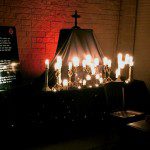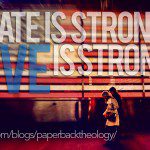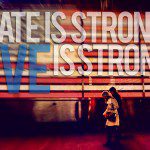 I’m reading Pilgrim at Tinker Creek by Annie Dillard right now. This morning I was reminded one of the great lessons Dillard, and others like her, have taught me about prayer. She says that when you actually catch a glimpse of the holy, you are innately aware at the time that it is so rare and precious, that you know instinctively that you can no more catch hold of it than you can catch hold of a sunbeam. If you truly believe you can catch hold of it, what you’ve got in your hands is not God. You can bottle neither lightning nor the presence of God. I wonder what this says about our attempts to package and sell spirituality, or even teach it (which I’m convinced we must).
I’m reading Pilgrim at Tinker Creek by Annie Dillard right now. This morning I was reminded one of the great lessons Dillard, and others like her, have taught me about prayer. She says that when you actually catch a glimpse of the holy, you are innately aware at the time that it is so rare and precious, that you know instinctively that you can no more catch hold of it than you can catch hold of a sunbeam. If you truly believe you can catch hold of it, what you’ve got in your hands is not God. You can bottle neither lightning nor the presence of God. I wonder what this says about our attempts to package and sell spirituality, or even teach it (which I’m convinced we must).
The thought this brought to me this morning was that, although I enjoy teachings on spirituality and prayer, any conversation about experiencing the presence of God that begins with “It’s about…” or “You just have to…” is beginning to lose interest for me. I’m losing interest in them for the reasons Dillard describes. She says that prayer is of course a discipline, but it is one that is learned over a lifetime of dedicated struggle, and the outcome you desire isn’t guaranteed. There are no prayer experts, there are only beginners. I don’t know many people who try to pray more than I do. I don’t know many people who fail to pray as much as I. Those who claim to have opened a ceaseless portal into the presence of God must either be living a categorically different existence than me, or they are not doing what they believe themselves to be doing. Dillard says:
“The world’s spiritual geniuses seem to discover universally that the mind’s muddy river, this ceaseless flow of trivia and trash, cannot be dammed, and that trying to dam it is a waste of effort that might lead to madness. Instead you must allow the muddy river to flow unneeded in the dim channels of consciousness; you raise your sights; you look along it, mildly, acknowledging its presence without interest and gazing beyond it into the realm of the real where subjects and objects act and rest purely, without utterance.” (p.32)
First of all, let’s just tell the truth. Annie Dillard is the type of writer who makes me want to sew my mouth shut. What she can do with words… I may never recover. More to the point, however, is the great insight that there is no making prayer happen. We cannot will ourselves to see God. This calls into question most of what passes itself off as wisdom concerning prayer and the presence of God as the practice of magic–a subtle (or not) method of conjuring–that in the end turns out to be a kind of self-deception. As I’m reading PATK I’m constantly thinking that most of us who claim to be gardeners are really just pulling weeds.
“The secret of seeing is, then, the pearl of great price. If I thought he could teach me to find it and keep it forever I would stagger barefoot across a hundred deserts after any lunatic at all. But although the pearl may be found, it may not be sought. The literature of illumination reveals this above all: although it comes to those who wait for it, it is always, even to the most practiced and adept, a gift and a total surprise.” (p.33)
Seeing the world that God has created, bathed in the presence of the divine, is the heart of prayer. Recognizing the presence of the God who was already there the whole time is so much harder than we can ever think or imagine. We cannot “know that I know that I know” God is with us. It doesn’t work that way. We fall into it. It happens when we least expect it and almost never when we think it should. We cannot look for this pearl, we can only wait for it, and even then it will be a total surprise. So what do we do? “‘Launch into the deep,’ says Jacques Ellul, ‘and you will see.’ … I cannot cause light; the most I can do is put myself in the path of its beam.” (p.33)
Seeing the world that God has created, bathed in the presence of the divine, will undo us completely. It will be our simultaneous doing and undoing, knowing and unknowing, having and un-having, and when it happens for real, we will rarely speak of it. And we will never hold it up before others as the source of our enlightenment. We are beginners, all of us, and that’s all we’ll ever get to be.












